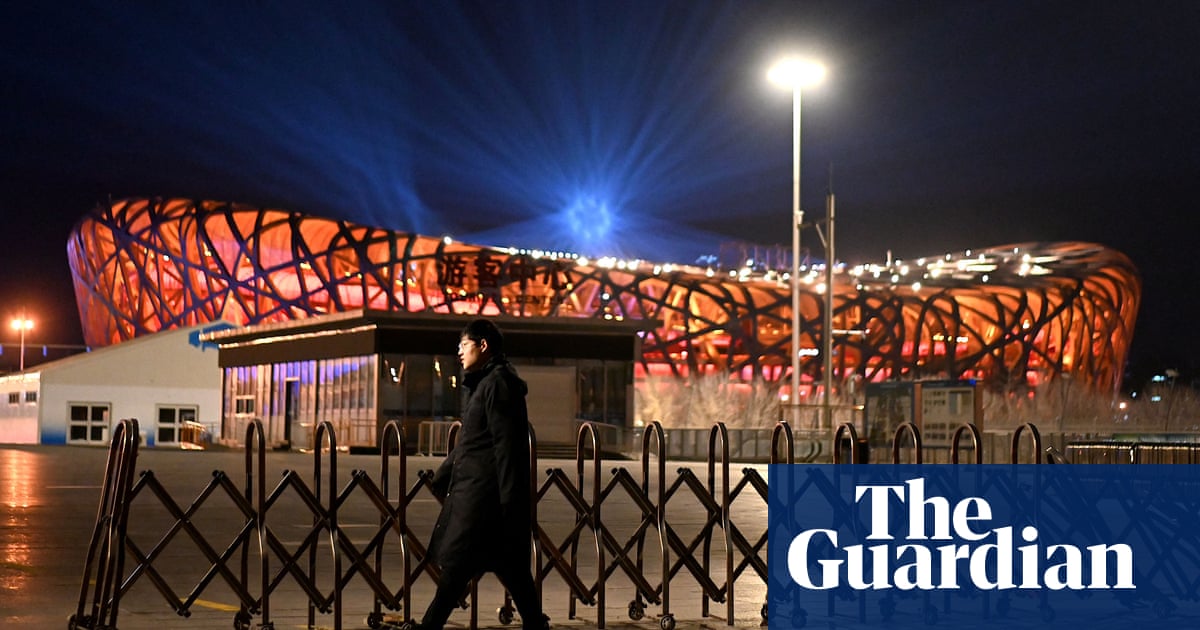
Show caption A member of security walks past the Beijing National Stadium, the venue for the opening and closing ceremonies of the 2022 Winter Olympics. Photograph: Noel Celis/AFP/Getty Images Winter Olympics 2022 Sebastian Coe calls political boycott of Winter Olympics ‘meaningless’ The US, UK and others will not send officials to Beijing
China’s human rights record is under intense scrutiny Sean Ingle @seaningle Thu 30 Dec 2021 22.30 GMT Share on Facebook
Share on Twitter
Share via Email
Sebastian Coe has doubled down on his insistence that boycotting the Beijing Winter Olympics over China’s human rights record and treatment of the tennis star Peng Shuai would be a mistake, and says that dialogue and relationships are a better way of “flicking the dial” politically and socially.
In his strongest intervention yet, the head of World Athletics and senior IOC member said that sporting boycotts were “historically illiterate and intellectually dishonest” and described the political boycott announced by the US, UK and other western countries as “frankly meaningless”.
Human rights groups have accused China of forcibly interning more than a million Uyghurs in re-education camps in Xinjiang, submitting them to forced sterilisations and intentionally destroying their culture, as well as destroying democracy in Hong Kong.
That view is supported by the Biden administration, which earlier this month confirmed it would not send diplomats to the Winter Games due to “ongoing genocide and crimes against humanity in Xinjiang and other human rights abuses”.
However, Coe insisted that a “balance” needed to be struck when it came to human rights and countries like China. He rejected claims that such a stance was ignoring the situation that the Uyghurs and others faced.
“I’m not insouciant or cavalier about human rights, I take them very seriously,” he said. “But we have to be realistic, when we take our events around the world there are going to be challenges: culturally, politically, socially. I guess my fallacy position on this is always, in an imperfect world, sport is the one continuum that can actually create some stability. I’ve witnessed time after time the impact that sport has had in flicking that dial, socially, politically, economically.”
When asked about boycotts, Coe, who led the London 2012 Olympic and Paralympic Games Organising Committee, was blunt. “Boycotts on balance are historically illiterate and intellectually dishonest,” he said. “A political boycott is, frankly, meaningless. And in a world where I actually think discussion and relationships are important, rarely do I see isolation bearing fruit.
“But that’s not to be an apologist for countries that do not conform to the basic standards around human rights. I’ve never witnessed sport leaving any country in worse shape than when it’s been there. The impact across the board can be, on many occasions, quite profound.”
Sebastian Coe says that he takes human rights ‘very seriously’. Photograph: Shuji Kajiyama/AP
Last month the WTA suspended tennis tournaments in China due to concerns over Peng’s safety, but Coe defended World Athletics’ plans to double the number of Diamond League events in China to two next summer.
“It’s for each sport to decide its own approach,” said Coe. “It’s not an approach we would take in World Athletics and I don’t think over the long haul it is one that actually achieves a great deal. There are always unintended consequences. And at the end of the day, the people that most suffer in all that are the athletes.
“All athletes should be free to voice their concerns and they should be free to without fear of censure and they should be able to travel freely,” he said. “That is an important right. But we’re talking about extrapolating from that into boycotting a sporting event, and I think there has to be proportionality here, and I think there has to be balance.”
Meanwhile Coe confirmed that the Athletics Integrity Unit would be stepping up its safeguarding efforts in the sport. It comes after the Guardian revealed that the top sprint coach Rana Reider is being investigated by the US Center for Safesport after multiple complaints of sexual misconduct were made against him.
UK Sport is also looking into whether UK Athletics properly handled an allegation involving Reider and an 18-year-old sprinter when it was made in 2014. While Coe would not comment specifically on that case, he accepted that athletics had to do more to make the sport safe.
“I don’t know what is taking place within UKA,” he said. “I’m sure they would want themselves to look at what happened and they will need to go back through that particular pathology. But one of the things that came out of our congress was to extend the mandate of the AIU. It can look more broadly at some of these safeguarding issues.
“It can’t become the world’s policeman on this, but I think it will take a far greater interest in those kinds of issues. During the convention we had Charlie Webster tell her story, and I can tell you that within hours of that, both World Athletics and the AIU were contacted by federations who said they couldn’t sit any longer and watch certain individuals just getting jobs in the system knowing what they knew. It was as if their conscience got pricked on this.
“If we are all being honest about it there are red flags that sometimes get ignored, and too often a problem is swept away from one federation and unwittingly ends up in another federation. It’s really important we are able to share that kind of information in federations wherever they occur, because there are too many of them.”








